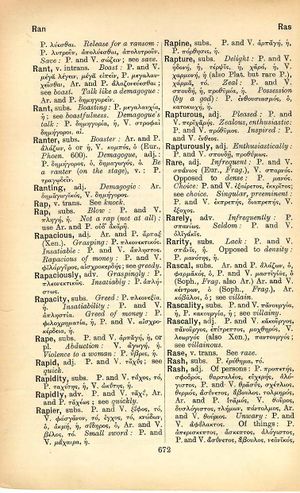rap: Difference between revisions
From LSJ
έγ', ὦ ταλαίπωρ', αὐτὸς ὧν χρείᾳ πάρει. τὰ πολλὰ γάρ τοι ῥήματ' ἢ τέρψαντά τι, ἢ δυσχεράναντ', ἢ κατοικτίσαντά πως, παρέσχε φωνὴν τοῖς ἀφωνήτοις τινά → Wretched brother, tell him what you need. A multitude of words can be pleasurable, burdensome, or they can arouse pity somehow — they give a kind of voice to the voiceless | Tell him yourself, poor brother, what it is you need! For abundance of words, bringing delight or being full of annoyance or pity, can sometimes lend a voice to those who are speechless.
(CSV4) |
m (Woodhouse1 replacement) |
||
| Line 1: | Line 1: | ||
{{Woodhouse1 | {{Woodhouse1 | ||
|Text=[[File:woodhouse_672.jpg|thumb|link={{filepath:woodhouse_672.jpg}}]] | |Text=[[File:woodhouse_672.jpg|thumb|link={{filepath:woodhouse_672.jpg}}]] | ||
===verb transitive=== | |||
See [[knock]]. | See [[knock]]. | ||
===substantive=== | |||
[[blow]]: [[prose|P.]] and [[verse|V.]] [[πληγή]], ἡ. | |||
[[not a rap]] ([[not at all]]): use [[Aristophanes|Ar.]] and [[prose|P.]] [[οὐδ' ἀκαρῆ]]. | |||
}} | }} | ||
Revision as of 08:59, 20 May 2020
English > Greek (Woodhouse)
verb transitive
See knock.
substantive
not a rap (not at all): use Ar. and P. οὐδ' ἀκαρῆ.

